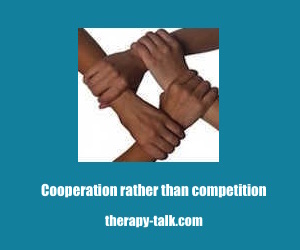
Articles: Page 2
Cooperation rather than competition
Cooperation rather than competition
We live in such competitive times that I would like to reflect on this race that seems to lead nowhere. The evidence indicates that excessive competition generates a very aggressive energy and represents the opposite of collaboration. Competition can promote rivalry, selfish attitudes and often leads to manipulation to satisfy personal ambitions at all costs. Individualism and competitiveness cause great anxiety, stress and bullying in all spheres of society.
Instead, the evidence shows that people who collaborate face better the changes and challenges to achieve their objectives. In addition, they respect differences and appreciate the skills that everyone provides in the group to facilitate the common purpose. Cooperation emphasises that each person has something valuable to contribute and the synergy of the group creates a process that is above the individual or his vanity, and where everyone can learn and benefit from each other.
On the other hand, personal wellbeing is essentially linked to the group and the community, given that we are interconnected and what affects "the whole" impacts everyone in the end. That is why, I believe that the greatest triumph is not to be the first or the best, but to reach the goal together and learn to collaborate rather than compete.

Inma Romero
Self-expansion
Who Am I? A very good question to ask ourselves, especially at times of disturbance.
The feelings of disillusionment, anger, sorrow, fear and guilt come from an identification with the content of our consciousness. The story our thinking spins about our predicament in the drama of our mind.
If it is hurting we are cast in victimhood role. It feels real because we believe unquestionably the script. But is there another story, a bigger context in which we are participants, parallel to the intense melodrama we find ourselves in time and time again?
Perhaps an answer glimmers high up in the stars, when we look with wonder at the mystery of what the reality of the cosmos we are part of is. Perhaps we can let go of the worry and the effort of controlling our universe. The firmament appears to hang well together and the celestial bodies move effortlessly and harmoniously. Perhaps we dare to ride along, feel part of everything and be at home just where we are.
Nitsa Economidou
The quest for authenticity
We seem to be on a never-ending mission for an identity that feels comfortable, rational, intelligent, exciting, promising, attractive, and all the 'positive' qualities we think would make us, and our lives, worthwhile.
These preconceived ideas are part of the stream of thoughts that flow naturally through us and are not restricted to pleasant states of mind only, however hard we try to avoid 'negative' identifications such as fear, anger, envy, sadness and numbness.
So since both our 'selected' selves, as well as those we try to avoid, are part of a passing parade of elusive concepts we need an alternative approach if we can have a hope for breaking out of this futile process.
It seems that our hope for interrupting the compulsive reconstruction of false identities lies in the letting go of conditioned expectations and knowledge, and allowing instead space for 'not knowing', for being open to fresh, deeper glimpses of reality, new understanding and wisdom perhaps.
Meditation is a way to consciously observe the thoughts as they emerge and deliberately letting them go.
Counselling and coaching are also effective methods to speed up the process of change by increasing our awareness of the conditioned ways we operate and by helping to free ourselves from patterns of restrictive thinking and behaviour.
Nitsa Economidou
How to enhance your wellbeing
Try to be as objective as possible in your interpretation of reality. The anxious person tends to worry about everything. They often incriminate themselves, adopt attitudes of victims or are very perfectionists. So, it is important to identify the illogical or distorted perceptions that promote negative thoughts and concerns. Examples of distorted thoughts:
- Catastrophism: To view the reality in a terrible and pessimistic way.
- Overestimation: To exaggerate a negative fact.
- Generalisation: To think that a single event will be repeated forever.
- Filter: To ignore the positive and focus on the negative.
- Emotional Reasoning: The erroneous evaluation of a situation under pressure of intense emotions.
- An exaggerated sense of duty.
Other positive steps to improve your emotional wellbeing:
- Defend your rights by being assertive: Assertiveness is to state your rights, needs and opinions openly, respecting the dignity of others but remaining firm.
- Express your emotions correctly: Repressed feelings are as harmful as the lack of control of their expression.
- Learn to be calm: Practice relaxation techniques, visualisation and meditation to achieve emotional wellbeing.
- Nurture your sense of humour and optimism: A smile generates the corresponding emotion and you will begin to feel better. It also promotes the ability to think clearly and makes it easier to find solutions to problems.
- Develop your creativity: Always a source of encouragement and self-esteem. Creativity is the ability to create, to formulate ideas, to imagine and solve problems in a different way.
Inma Romero
